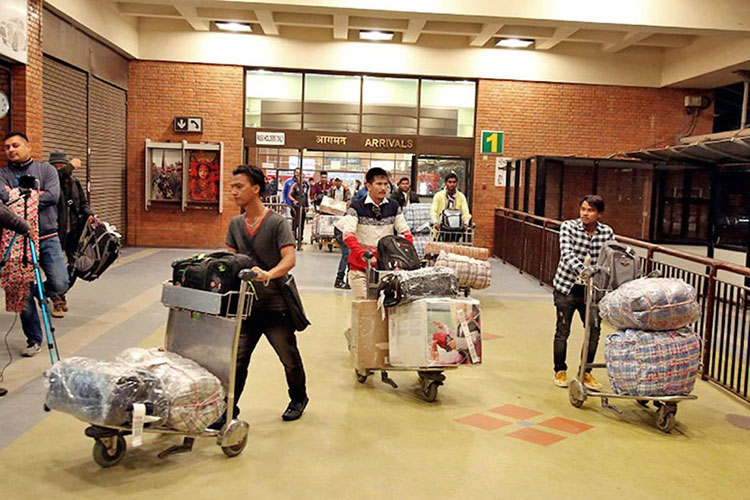Kathmandu (RSS): The government has data on the number of people rescued from repatriated countries after the global impact of COVID-19, but it is difficult to find out what work or business they are involved in returning.
What kind of employment do they want? It has not been seen that they have to work in the national economy by certifying their skills and abilities and training the semi-skilled people and putting them in the job market.
According to the statistics of the Ministry of Labor, Employment and Social Security as of September 15, a total of 142,807 applications have been received for rescue from the troubled foreign employment including Kovid-19 and 132,825 have been rescued. Of the 7,839 applications for re-employment, only 1,659 have been received.
Of the 514 applications for new labor permits, 363 have been received. This statistic shows that returnees do not want to work abroad immediately. The number of people going to work abroad may not have increased due to the closure of international flights and checkpoints during the shutdown.
According to the Ministry of Labor, the number of registered unemployed has reached 569,653 by mid-October. Of those included in the list, 39,730 were employed, according to the ministry.
They have zero number of skills tests and orientations, meaning that not a single person has been involved in skills testing and training. While the government is advancing the national aspiration of ‘Prosperous Nepal, Happy Nepali’, it is the responsibility of the government to provide jobs to all the youths who have left their jobs abroad or returned home after completing their term.
The Council for Technical Education and Vocational Training (CTEVT) under the Ministry of Education, Science and Technology, which is also conducting national skill tests, has so far been conducting short-term training programs aimed at 50,000 workers in the labor market annually.
Anil Muni Bajracharya, information officer of the council, said that a survey was being prepared on the skills and employment needs of the returnees but the training and orientation could not be conducted immediately due to the increased risk of corona.
The council has given the test for those who want to join the skill test. Since this test only tests a person’s skills, it may not be of particular importance in employment alone. The government is developing the national aptitude test system and making legal arrangements so that formal education and technical education can be equated to higher education and move from one stream to another.
Spokesperson of the Ministry of Education Deepak Sharma called on the Vice Chancellor of Nepal Open University Dr. He said that work is being done for its legal formulation under the coordination of Lekhnath Poudel. Sharma said that discussions are underway to include the subject of aptitude test in the formulation of the Federal Education Act or to make a separate law for it.
The National Skills Testing Committee aims to provide vocational training in the agricultural sector by testing the qualifications of such persons and identifying their skills and abilities to mobilize state and local level structures on the basis of capacity identification. They will also be given training in infrastructure development, construction, hotel management and health.
In the analysis of the council, by conducting skill project for sustainable and dignified employment, it will be easy to raise the standard of living through foreign employment by learning technical and professional skills such as plumbing, carpenter, cook, nursing etc. which are in high demand in developed countries.
A survey of the foreign employment market found that the salaries of skilled middle-class manpower for occupations such as electrical, plumbing, carpenter, shuttering, civil and mechanical overseer were more than three times that of ordinary workers.
According to Dr Hari Pradhan, an expert in technical and vocational education, the UNDP and the International Organization for Migration (IOM) are studying returnees, pointing out the need for a system to use their skills and experience.
Efforts to teach vocational skills and knowledge at school level in Nepal have been started since 2004 BS. In order to provide employment and self-employment by imparting technical and vocational skills to the students at that time, in addition to general subjects, subjects like agriculture, construction, harvesting, weaving and handicrafts were included in the community schools and vocational education was provided from the basic level.
The report of the National Education Planning Commission, 2011 had further theorized it. The Technical Education and Vocational Training Council Act, 2045 BS was passed in 2045 BS and the Technical Education and Vocational Training Council has been formed for the development and expansion of technical and vocational education in the country.
CTEVT aims to expand the vision of ‘Skilled Nepal, Prosperous People’ and equal access to technical and vocational education and training, and to enhance the quality, timeliness and efficiency of technical education and vocational training systems.
At present, the council has seven provincial offices, 59 organic schools / polytechnics, 20 partnership institutions, 534 technical schools in community schools, 429 privately run institutions and 1131 short-term vocational training institutes.
Around 1.5 million Nepalis return from abroad during covid-19 pandemic
